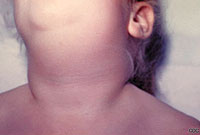Recently when I visited some schools in Kigali city, I came across different children who had been sent home because they had acquired mumps. These children usually have swollen cheeks or necks and complained of headache and fever.


Recently when I visited some schools in Kigali city, I came across different children who had been sent home because they had acquired mumps.
These children usually have swollen cheeks or necks and complained of headache and fever.
Mumps is an acute viral infection that is characterized by swelling of the parotid glands located just below and front of the ear.
A child with mumps will have symptoms like fever, headache, sores in the throat, earache, loss of appetite and chewing problems. Mumps makes one feel pain in the muscles and tired all the time.
If you have mumps you will usually be contagious for a total of 10 days - from several days before you get symptoms to around five days after symptoms appear. During this time people with mumps should be kept away from other people.
Research has shown that about one in 10 people with mumps develop viral meningitis. A quarter of men who catch mumps after puberty get swelling in the testes but rarely affects the fertility.
As a result, women can develop swelling of the ovaries but will also get rare cases of infertility. About four in 100 people have temporary hearing loss.
About one in 20,000 people have permanent hearing loss in one ear. Permanent hearing loss in both ears is very rare. About four in 100 people have swelling of the pancreas (pancreatitis).
If a pregnant woman is in the first three months of pregnancy and catches mumps, there is an increased risk of having a miscarriage.
Treatment
There is no specific treatment for mumps. Taking the painkiller you would normally take for a headache will help to ease the symptoms of the mumps.
If your child has mumps, give him or her junior paracetamol to help ease the symptoms. It’s also important to drink plenty of fluids to stop you from becoming dehydrated.
Prevention
Doctors say that the most effective way to protect yourself and children from catching mumps is immunisation with the MMR vaccine.
MMR is a combined vaccine against measles, mumps and rubella. This is given in two doses to children at around 13 months and when they are four. Teenagers and adults can also have the vaccine.
gachakim@yahoo.com




